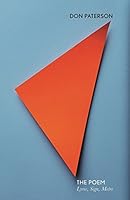
## Metadata
- Author: [[Don Paterson]]
- Full Title: The Poem
- Category: #books
## Highlights
- Prose evokes; the well-chosen word describes the thing as if it were present. But poetry persists in its attempt to invoke, to call down its subject from above, as if there were no ‘as if’ at all. ([Location 185](https://readwise.io/to_kindle?action=open&asin=B079GBZH7S&location=185))
- Music seems somehow precise in its emotional meaning, yet, quite unlike our object-taking word-sense, also feels wholly intransitive and ‘unparaphrasable’. When we seek to infuse our speech with a mood or emotion it cannot easily express, it’s to music, to the patterning of sounds, that we instinctively reach. This happens long before we’re moved to make a song or poem: in our spoken conversation, variations in rhythm, pitch and timbre are responsible for most of what we convey of our emotional tone, and much nuance and emphasis the mere word-sense of our speech cannot carry. ([Location 204](https://readwise.io/to_kindle?action=open&asin=B079GBZH7S&location=204))
- Dying is something we do very well; it’s an imaginative exercise we conduct so often, our own future deaths are generally inscribed in us by five or six years old. Compared with the squid’s, the sparrow’s and the squirrel’s, our existential condition is closer to one of ghosthood. ([Location 226](https://readwise.io/to_kindle?action=open&asin=B079GBZH7S&location=226))
- Our long-term memory encodes information semantically, our short-term memory acoustically, and these rhythmic, parallel and repetitive sound-tricks simply give the line a better chance of ‘hooking’ on a single hearing; ([Location 242](https://readwise.io/to_kindle?action=open&asin=B079GBZH7S&location=242))
- The most powerful mnemonic devices are brief speech, patterned speech and original speech. ([Location 289](https://readwise.io/to_kindle?action=open&asin=B079GBZH7S&location=289))
- The poem originates from an emotionally or intellectually urgent impulse in the mind of the poet, and simultaneously seeks out and is drawn to forms which reflect and facilitate that urgency. ([Location 299](https://readwise.io/to_kindle?action=open&asin=B079GBZH7S&location=299))
- I would generally hold that poems written without feeling teach us very little about poetry, and that it’s a bad idea to write a poem if you’re not moved to do so. (Which is why I maintain the unfashionable opinion that writing workshops where poems are actually written amount to little more than pleasant ways of passing the afternoon.3 The argument is that such workshops – where you write a poem whose topic is set by the person on your left, or in only monosyllables, or the voice of your socks – ‘jump-start the imagination’, but I confess that I’ve never been able to understand why merely living a reflective life shouldn’t suffice. I also suspect that an imagination that needs to be jump-started might be happier left sleeping. The results might be competent, but they’re rarely necessary.) ([Location 300](https://readwise.io/to_kindle?action=open&asin=B079GBZH7S&location=300))
- Poetry reveals language’s underlying metrical and intonational regularity, and its tendency to pattern its sounds; it reveals the metaphoric engine by which language revivifies itself, and the metonymic nature of all human naming (which represents things by foregrounding an aspect that humans find either useful or perceptually salient); it reveals the rhythms that dominate language’s natural phrase- and sentence-lengths, its narrative and argumentative episodes. The sum total of poetry’s forms and tropes are no more or less than the natural tendencies of emotional language made manifest, and then codified. The poet is engaged in something closely analogous to trying to remember a poem they have forgotten. While all poetic devices serve to increase the memorability of the poem for the reader (they all play a mnemonic role in addition to any other they might have), for the poet, their function is weirdly inverted: they are the very means, the intuitive tools of retrieval, by which the poem itself is drawn forth from the mind. The ‘little machine for remembering itself’ is doing just that, and – if the poet is working well – it can feel as if it is conjuring itself from nothing. ([Location 313](https://readwise.io/to_kindle?action=open&asin=B079GBZH7S&location=313))
- The ‘poetic effect’ invariably sits at the convergence of twenty different technical and imaginative considerations – metrical, lyric, cultural, stylistic, thematic, deictic and so on – which construct between them a poetic Gestalt. Within this, much like a chess player, the poet will attempt to make their beautiful move – sometimes consciously, but just as often instinctively, guided by the shifting net of forces they perceive around them. ([Location 328](https://readwise.io/to_kindle?action=open&asin=B079GBZH7S&location=328))
- In the poem’s composition, we often allow sound to guide us to sense, and vice versa: the ear can be trusted to think, and the mind to hear. ([Location 591](https://readwise.io/to_kindle?action=open&asin=B079GBZH7S&location=591))
- Margaret Magnus, Gods of the Word: Archetypes in the Consonants (Kirksville, MO: Thomas Jefferson University Press, 1999), 121. ([Location 844](https://readwise.io/to_kindle?action=open&asin=B079GBZH7S&location=844))